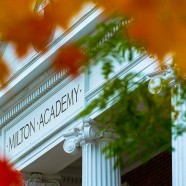
Eight new courses at Milton this year integrate disciplines in pursuit of a fuller understanding, and rely upon teachers working in collaboration. Last spring, teachers began preparing for their proposed course work through workshops with Veronica Boix Mansilla. A senior research associate at the Harvard Graduate School of Education, Veronica chairs the Future of Learning Institute. Her research examines how to produce quality interdisciplinary work addressing problems of contemporary global significance. Faculty are excited that these courses will allow students to think about relevant intellectual, social and cultural challenges in new ways.
Reading Consciousness
This course considers literature, philosophy and religion that investigates our notions of humanity, from antiquity to the present. Students will pose critical questions, lead discussions, and formulate writing prompts. Readings include writings by W. E. B. DuBois, George Eliot, Toni Morrison, René Descartes and Thich Nhat Hanh.
Neuropsychology: Influences of the Brain on Behavior
Beginning with a study of the brain, its structural areas and their functions, this course explores neuronal communication. Students will learn about the psychology of sensation, learning, memory, thinking, intelligence, motivation and emotion. We will explore the concepts of neuroplasticity, its influence on basic human function, and new research in neuropsychology.
The Omnivore’s Dilemma: Politics of Food in the 21st Century
This course explores political and social issues through the lens of food, considering its production, sale, preparation, consumption and disposal. Students will build a common understanding of these issues, then propose and execute independent projects, which will be evaluated by a “food working group” made up of students, faculty, and outside experts.
StoryCorps, Milton: Narrative Journalism and Performance
This course will teach the art of storytelling by coaching students to shape and share stories for both the page and stage. Students will learn narrative journalism skills, performance skills, and peer workshop practice; they will research, develop and present stories within Milton and beyond.
*StoryCorps is a non-profit organization and national project that collects, broadcasts, and archives the stories of ordinary people from around the country. (www.storycorps.org)
Becoming American: Immigrants and Immigration Today
How has immigration shaped what it means to be and to become, “American?” How does immigration influence our individual and national identity? This course will examine these questions through literary, historical, sociological and personal lenses.
Math, Politics and Society
This course applies branches of mathematics to current events. Drawing equally on mathematics and political science, using election analysis, conflict simulations, games, independent projects, research papers, and problem sets based on case studies, we will explore questions of power and fairness, leading to a broader understanding of our society and our world.
Documentary Filmmaking
This course explores the research techniques, methods and skills used in creating documentary film. With room for creativity and invention, students will construct a documentary that is visually engaging, as well as intellectually and emotionally appealing to a broad audience.
Creating Form and Space: Architecture and Engineering
Students will learn about the art, science and technology of both engineering and architecture as an integrated whole. Both courses include community engagement, reviews by professionals, and field trips. Projects will help students develop skills of analysis, communication, collaboration, and problem solving.
Architecture and Engineering 2-D introduces sketching, orthographic plan views, moment and shear diagrams, Google Sketchup and photography.
Architecture and Engineering 3-D introduces physical and virtual model building, structural studies, framing models and vibration modes.



